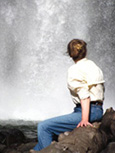 Malahat volunteer Will Johnson talks with Elyse Friedman, Far Horizons contest judge. In her interview, Friedman discusses literary influences, her prose versus screenwriting, and spills tips for new writers.
Malahat volunteer Will Johnson talks with Elyse Friedman, Far Horizons contest judge. In her interview, Friedman discusses literary influences, her prose versus screenwriting, and spills tips for new writers.
WJ: Your work is often praised for its humour—a quality I find is often lacking in many Canadian lit journals. What function does the humour serve in your fiction? Do you consciously set out to provoke the reader into laughter, or is it just a random by-product of the creative process?
EF: I don’t set out to write humorous fiction, I just have a naturally snide sensibility. I do think that humour adds texture and life to even the most serious and painful subjects. And I find it difficult to love books that are devoid of humour. I don’t think novels have to be knee-slappers, but books that are completely humorless are usually boring as hell. Like humorless people.
Read the rest of Elyse's interview on the Malahat website.
John Reibetanz, co-winner of the 2015 P. K. Page Founders' Award for Poetry
 Malahat volunteer and reviewer John Stintzi recently spoke with John Reibetanz on his poem, "Fresco Magic," which won the Malahat's 2015 P. K. Page Founders' Award for Poetry alongside Jan Zwicky. His poem was originally published in Issue 186, Spring 2014.
Malahat volunteer and reviewer John Stintzi recently spoke with John Reibetanz on his poem, "Fresco Magic," which won the Malahat's 2015 P. K. Page Founders' Award for Poetry alongside Jan Zwicky. His poem was originally published in Issue 186, Spring 2014.
JS: Judge Roo Borson noted that the Greek term “ekphrasis” could be used as an umbrella theme for both of this year's winning poems. What draws you (and the rest of us) to write through another's art?
JR: I think that one way of answering your question might be to revise the preposition in that last phrase, from “through” to “around.” One of the motives that leads poets to attempt writing ekphrastic poems is the same one that drives other artists to adorn the walls of subway stations or parking garages with graffiti: it’s a feeling that the work as originally conceived is incomplete, from the standpoint of the interloping artist; it could benefit from the introduction of an element that he or she can provide. For the poet, that element is time, the air we mortals breathe. Paintings are overwhelmingly atemporal and spatial, where poetry (rhythmical breathing) brings a sense of temporality, of time passing.
Read the rest of John's interview on the Malahat website.
Jan Zwicky, co-winner of the 2015 P. K. Page Founders' Award for Poetry
 Malahat editor John Barton revisits his interview with Jan Zwicky from the summer of 2014, with two new questions to mark her joint win, with John Reibetanz, of the Malahat's 2015 P. K. Page Founders’ Award for Poetry for her poem "Into the Gap," originally published in Issue 187, Autumn 2014.
Malahat editor John Barton revisits his interview with Jan Zwicky from the summer of 2014, with two new questions to mark her joint win, with John Reibetanz, of the Malahat's 2015 P. K. Page Founders’ Award for Poetry for her poem "Into the Gap," originally published in Issue 187, Autumn 2014.
JB: We are both deracinated prairie people, upon whom the grandeur of the open skies above Alberta’s parklands has left a lingering mark, made bittersweet by the fact that the landscapes we recall have been changed irrevocably by globalization and the province’s rapid and, to some, problematic growth. “Into the Gap” is both a revisitation of what I have come to view as the “first landscape,” and an elegy. Can you say something about this?
JZ: The farm — its earth, its sky, its poplar scrub — is one of my parents. Letting it go, when my mother had to move, was so huge I couldn’t imagine it, I could only stumble through, numb. What helped me most was the way the place I live now kept walking towards me, an extraordinary generosity. Eventually I got my feet back on the ground; the grief became coherent. It took about five years. Not that it doesn’t still hurt; but I’m not stunned by it. At least, not all the time.
Read the rest of Jan's interview on the Malahat website.
K'ari Fisher, winner of the 2015 Jack Hodgins Founders' Award for Fiction
 Former Malahat publicity manager and UVic Writing graduate student Susan Sanford Blades recently spoke with K'ari Fisher on her short story, "Mercy Beatrice Wrestles the Noose," which won the Malahat's 2015 Jack Hodgins Founders' Award for Fiction. This story was originally published in Issue 186, Spring 2014.
Former Malahat publicity manager and UVic Writing graduate student Susan Sanford Blades recently spoke with K'ari Fisher on her short story, "Mercy Beatrice Wrestles the Noose," which won the Malahat's 2015 Jack Hodgins Founders' Award for Fiction. This story was originally published in Issue 186, Spring 2014.
SSB: First, can you take us through how this story came together for you? I’m thinking specifically of the characters, the setting, and the premise (wrestling)—which are all so unique and full of life. Did they all congele at once, or did you start out with, say, Ghost-Mom, and everything came together as you wrote?
KF: This story went through a series of incarnations before it became this one. First, it was based on some of the characters from an old novel that I started and never finished. The setting, Bodie, was also in that novel, as was the junkyard, the train, and the reservoir. The idea to write about a girl wrestler is one I’ve had for awhile. Nothing was planned in advance. Everything was pieced together and then smoothed into a story. The practice of culling down a novel meant I could focus on the parts that I really liked.
Read the rest of K'ari's interview on the Malahat website.